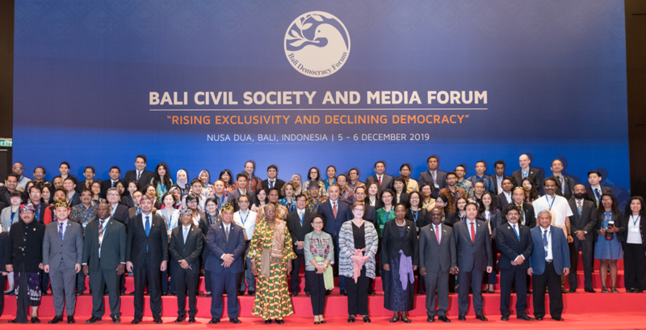Liberal democracy has been seriously questioned and challenged in Europe. To act against democratic backsliding in Hungary and other EU member states, EU institutions initially relied mainly on EU infringement procedures. The EU has complemented these instruments with a rule of law conditionality mechanism and developed procedures on how to suspend membership rights (Article 7, Treaty on the EU). The Council of Europe and its Venice Commission have elaborated an extremely valuable series of documents defining key principles and institutions of liberal democracy. However, these elements have not yet evolved into a coherent constitutional blueprint for a liberal democracy, not least because national institutional arrangements differ significantly.
Category: Invited talk
Movement Parties and Democratic Quality
A panel debate at the ECPR virtual General Conference, 3 September 2021

How does the emergence of anti-establisment movements and movement parties affect democracy? How do movement parties transform institutions and procedures of democratic representation? What implications have their ideological leanings on democratic quality? How does their use of digital media bear on their forms of action, organizational structures and cultures of advocacy? How has the pandemic affected their evolution and their linkages with civil society?
Conditions of Democratic Backsliding
Shop Talk at Pew Research Center, Washington DC
Democratic backsliding can be defined as the gradual weakening of checks on government and civil liberties by democratically elected governments. In my talk I discussed potential causal paths likely to trigger and support backsliding. By comparing episodes of democratic decline over time and with countries not affected by backsliding, I investigated the extent to which weaknesses of particular democratic institutions, economic crises, exposure to globalization, the presence of populist political actors and polarized political communication in a digital public sphere contribute to backsliding. My empirical analysis was based, amongst others, on the Digital Society Survey and the Global State of Democracy (GSoD) Indices, an set of composite indicators that measure democratic performance across 158 countries from 1975 to today.
Rising Exclusivity and Declining Democracy
Panel Debate at the Bali Civil Society and Media Forum, Bali, Indonesia
The Bali Civil Society and Media Forum (BCSMF) took place in the framework of the 12th Bali Democracy Forum, a large meeting of governmental and non-governmental representatives mainly from Asian and Pacific countries. Its organizers, the Djakarta-based Institute for Peace and Democracy and the Indonesian Ministry of Foreign Affairs seek to make democracy a strategic agenda in the Asia-Pacific.

My contribution focused on how increasing social inequality contributes to weaken democratic accountability. Other panelists included Peter deSouza and Nejib Friji. The subsequent discussion was quite diverse, ranging from the role of technology in democracies over the accommodation of minorities, the rise of ethno- and religious nationalism, the participation of youth in democracy to the relationship between democracy and capitalism.
Can Responsiveness Substitute Accountability?
Lessons from the Central and East European Laboratory of Populist Democracy. A paper presented at the conference ” Totalitarian Reverberations in East-Central Europe”, Faculty of European Studies, Babes-Bolyai University, Cluj-Napoca, 26 October 2018.
Responsiveness characterizes a democratic process that „ induces the government to form and implement policies that the citizens want” (G. B. Powell). Populist parties advocate public policies that reflect the preferences of ordinary citizens, and their electoral success indicates that people believe their claims. Governing populist parties in Hungary, Poland and other Central and East European countries have systematically eroded institutions of democratic accountability, justifying these policies as measures to strengthen popular democracy and to fulfill the promises of the post-1989 democratic transitions. Although this erosion has been criticized as democratic backsliding and illiberal drift by scholars and international institutions, significant shares of voters continue to view it as steps towards a more responsive democracy.
Patterns of Democratic Backsliding
A paper for the ECPR General Conference, Hamburg, 25 August 2018, Panel 408: Same ingredients, different recipes: EU leverage and democratic backsliding in new member states and candidate countries
The subsequent economic and refugee crises have weakened the credibility of mainstream political parties in East-Central and Southeast Europe (ECSE) since prosperity and security no longer appear to be guaranteed consequences of European integration. The declining legitimacy of incumbents has provided opportunities for populist and anti-establishment mobilization. While these crisis-induced influences have been similar in all ECSE countries, the extent to which populist challengers have been able to win elections and form governments has varied significantly across countries. To explore these differences and assess the likelihood of populist electoral victories and subsequent illiberal policies in ECSE, the paper combines case studies of Hungary, Macedonia and Poland with a multivariate analysis of party systems, issue dimensions and cleavage configurations. It is argued that populist parties have attained political majorities through bipolar party competition, facilitated by congruent cleavages, particularly the congruence between sociocultural and EU-related cleavages. Based upon a comparison of the country cases, the paper discusses conditions that could constrain the illiberal erosion of democracy in ECSE.
Legitimation Functions and Legitimacy Resources
A typology for the analysis of post-Soviet countries, presented at the Joint Bavarian-Russian Conference on Interdisciplinary Humanities and Social Sciences, University of Bayreuth, 7-8 June 2018
Recent studies of legitimation patterns in authoritarian and democratic regimes have used a variety of classifications. Reviewing these approaches, I presented an integrative typology of legitimation functions and legitimacy resources based on David Beetham’s concept of political legitimacy. According to Beetham, the legitimate exercise of power must conform to established rules, the rules need to be justifiable by reference to shared beliefs, and the given relations of power require the express consent of subordinates.
Content and Discourse Analysis
Online Lecture at American Space, Almaty, 2nd April 2018
Content and discourse analysis belong to the standard toolbox of qualitative research in the social sciences. They enable scholars to analyze the structures and practices of public communication. Rooted in the positivist epistemological tradition, qualitative content analysis is aimed at the systematic mapping and classification of textual data. Researchers formulate hypotheses and construct a coding frame of categories to structure the data and detect underlying patterns or trends. In contrast, discourse analysis is embedded in the constructivist and hermeneutic traditions of the social sciences. The key aim of this method is to interpret the implicit meaning of discourse fragments and situate them in the context of larger frames, discourses or narratives.
Challenges to Strategic Government

The European Union encourages and expects its prospective new member states to establish systems of medium-term strategic planning. A meaningful strategic planning process that involves informed choices of priorities and changing existing practices of policymaking is, however, difficult to institutionalize. The chapter sequence of EU accession negotiations pre-defines a policy agenda, leaving little scope for endogenously determined policy priorities. Commitments taken in cooperations with other external donors / actors require tailored strategic planning activities that tend to occur in parallel, emerging from line ministries and usually without prior coordination between departments. Existing routines of planning and budgeting need to be reorganized and adapted which also implies redefining the roles played by coordinating institutions. Ministers and their political advisors need to be convinced and familiarized with the new planning process, which is often associated with changing institutional culture.
In my talk, I discussed these challenges by drawing on information collected during various consultations with civil servants in the Government of Montenegro. Montenegro constitutes a crucial case because it is considered to be a frontrunner among the Western Balkan EU accession candidates. Like other Southeast European countries, Montenegro lacks administrative capacity due to the small size of its public administration and tightening fiscal constraints due to its growing public debt.
See also:
Crisis Trajectories and Patterns of Resilience in East-Central and Southeast Europe

The subsequent economic and refugee crises have questioned the promise of prosperity and security associated with European integration. Governments in East-Central and Southeast Europe struggled to bridge between the diverging policy expectations of voters on the one hand, international economic and political actors on the other. The weakened credibility of mainstream political parties provided opportunities for populist and anti-establishment mobilization. While these crisis-induced influences have been similar in all countries of the region, the extent to which populist challengers have been able to win elections and implement their preferred policy preferences has varied significantly across countries.
In my paper, I analyze the conditions and constellations that account for the resilience of countries with regard to the domestic political consequences of the European crises. I argue that populist challenger parties benefit from bipolar competition because they use polarizing frames of people versus elites to mobilize electoral support. The fragmentation and polarization of party systems reflect the nature of the electoral system and the configuration of cleavages in society. A majoritarian electoral system and congruent cleavages have supported the emergence of bipolar party system in Hungary and Poland. In contrast, cross-cutting cleavages tend to generate and sustain multi-polar party systems. These party systems facilitate the entry of new parties, but have posed obstacles to new parties trying to broaden and consolidate their constituencies. To assess the intersection or congruence of cleavages, the paper studies the configuration of differences among parties on salient policy issues.
See also: